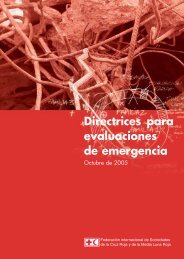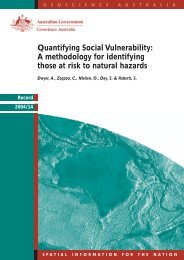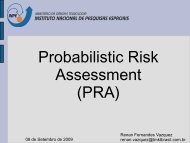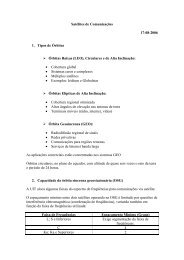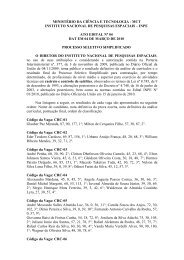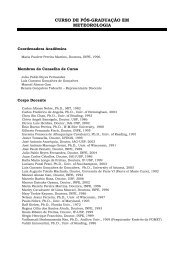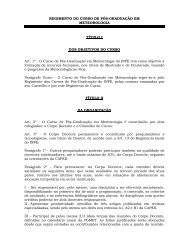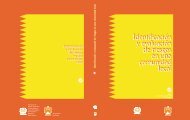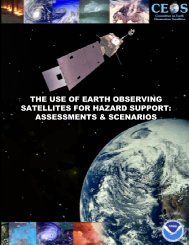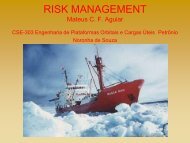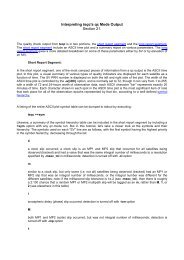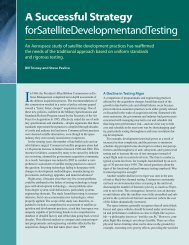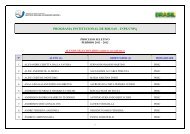Living with Risk. A global review of disaster reduction initiatives
Living with Risk. A global review of disaster reduction initiatives
Living with Risk. A global review of disaster reduction initiatives
You also want an ePaper? Increase the reach of your titles
YUMPU automatically turns print PDFs into web optimized ePapers that Google loves.
3<br />
<strong>Living</strong> <strong>with</strong> <strong>Risk</strong>: A <strong>global</strong> <strong>review</strong> <strong>of</strong> <strong>disaster</strong> <strong>reduction</strong> <strong>initiatives</strong><br />
help group advocates the interests <strong>of</strong> more than<br />
4,000 residents in matters <strong>of</strong> local flood protection.<br />
It strives to achieve a balance between the<br />
legitimate protection <strong>of</strong> the population and the<br />
aims <strong>of</strong> a sustainable floodwater policy which<br />
also must include the rights <strong>of</strong> downstream<br />
inhabitants and the river as a whole. This<br />
means, for instance, that while the group supports<br />
the construction <strong>of</strong> polders on the upper<br />
reaches <strong>of</strong> the Rhine and its tributaries, it also<br />
expects the city <strong>of</strong> Cologne to undertake its<br />
own considerable efforts to ensure that any<br />
retention areas which are sacrificed as a result<br />
<strong>of</strong> structural mitigation practices are compensated<br />
by other natural means <strong>of</strong> water retention<br />
in the municipal area.<br />
Building local self-reliance: sharing<br />
resources, building partnerships<br />
Disaster <strong>reduction</strong> depends on the conscious<br />
commitment <strong>of</strong> individuals and communities<br />
– understanding and accepting the values <strong>of</strong><br />
changed behaviour, having access to the technical<br />
and material resources necessary for<br />
doing so, and accepting the personal responsibility<br />
to carry through the efforts involved.<br />
Communities are generally unaware <strong>of</strong> the<br />
hazards they face, underestimate those they<br />
know <strong>of</strong>, and overestimate their ability to<br />
cope <strong>with</strong> a crisis. They also tend not to put<br />
much trust in <strong>disaster</strong> <strong>reduction</strong> strategies,<br />
and rely heavily upon emergency assistance<br />
when the need arises.<br />
Taking such a viewpoint into account highlights<br />
the need for tools that can create a culture<br />
<strong>of</strong> prevention against all forms <strong>of</strong> hazards<br />
<strong>with</strong>in local communities. This requires the<br />
knowledge <strong>of</strong> practical and low-cost methods<br />
which address likely hazards that can be conveyed<br />
to a wide-variety <strong>of</strong> participants including,<br />
community groups, trades people, commercial<br />
and financial interests and local government<br />
employees.<br />
Case: Indonesia<br />
In recent years, Bandung, Indonesia has suffered<br />
repeated floods. The communities most<br />
affected are low-income populations. They sel-<br />
dom have ready access to warning information<br />
or emergency equipment that would enable<br />
them to evacuate or otherwise protect their<br />
possessions. Efforts to reduce the risk <strong>of</strong> annual<br />
floods through strategic plans on reducing<br />
damage created by <strong>disaster</strong>s are necessary.<br />
These plans should include knowledge on protecting<br />
lives and assets, encouragement to the<br />
community for minimizing risk <strong>of</strong> <strong>disaster</strong>s,<br />
and continuing to improve the quality <strong>of</strong> life.<br />
In 2000-2001, the government <strong>of</strong> Indonesia<br />
asked the Bandung Institute <strong>of</strong> Technology (BIT)<br />
to implement a community empowerment<br />
project in cooperation <strong>with</strong> ADRC. ADRC,<br />
located in Japan, learned lessons from the<br />
Great Hanshin-Awaji Earthquake in 1995,<br />
about how community participation is indispensable<br />
to enhance <strong>disaster</strong> management<br />
capability at local level. Thus the project was<br />
aimed to enable local residents in the communities<br />
to cope properly <strong>with</strong> flood <strong>disaster</strong>s.<br />
Two flood-prone districts were taken as model<br />
cases. This project included town-watching, in<br />
which local residents walked around their communities<br />
<strong>with</strong> experts such as researchers from<br />
BIT and related institutions, to discuss the risk<br />
<strong>of</strong> <strong>disaster</strong> occurrence and points to be<br />
improved for <strong>disaster</strong> <strong>reduction</strong>. As a result,<br />
local residents themselves proposed specific<br />
measures, such as making roadway improvements,<br />
constructing protective banks and better<br />
defining the watercourse in order to reduce<br />
future flood risks.<br />
Case: selected Asian countries<br />
(India, Indonesia, Nepal, and Uzbekistan)<br />
The United Nations Centre for Regional<br />
Development/Disaster Management Planning<br />
Hyogo Office (UNCRD Hyogo Office) was<br />
established in Kobe, Japan in April 1999 to<br />
promote <strong>disaster</strong> mitigation activities by examining<br />
the reconstruction process in Hyogo and<br />
disseminating the experiences there to <strong>disaster</strong>damaged<br />
areas in developing countries. It provides<br />
advisory services to vulnerable communities,<br />
especially in ways that can improve the<br />
safety <strong>of</strong> primary community facilities such as<br />
schools and hospitals vulnerable to <strong>disaster</strong>s,<br />
and by identifying and then disseminating best<br />
practices in <strong>disaster</strong> management at the community<br />
level. UNCRD Hyogo Office helps to<br />
develop <strong>disaster</strong> resistant communities by link-<br />
146



